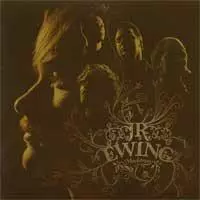Norway's JR Ewing began life as a remarkably aggressive Gravity Records-style screamo band; their excellent early material -- particularly that on Calling in Dead -- was exactly what you'd expect: vicious, occaisonally blazing fast, and often simmering screamo with plenty of angular melodies and spazzed out vocals. Over time, as bands often do, the band evolved their sound, with it reaching a pinnacle on 2003's Ride Paranoia, a record which was as aggressive as the early work, but possessed with more dynamics and more melody. With their now final record, Maelstrom, however, the band has taken an even sharper turn, and one that, for better or for worse, is a "maturing" of their sound.
While JR Ewing hasn't completely abandoned their hardcore roots, the band is clearly aiming for a cleaner sound; the easiest comparison is certainly later-era At the Drive-In, not simply in the high-pitched clean vocals and occasional screaming, but in the complexity of the work. Guitarists Erlend Mokkelbost and Hakon Mell develop a strong interplay with ringing melodies bounced off each other; each note seems to be dripping with atmospheric effects. The dueling guitars are far less distorted and sound almost jangly, taking on the character of bands like Built to Spill.
Vocalist Andreas Tylden is perhaps the most changed aspect of the band, with his vocals sounding like Perry Farrell (Jane's Addiction) and Johnny Whitney (Blood Brothers) at various moments. Tylden takes on the pop song with "Take a Hint," which engages the band in complex harmonies, occasional spazzouts but frequent mellow moments. His strongest performance certainly comes in "Pitch Black Blonde," which strengthens the proceedings with a nice wall of instrumentation and thereby making up for some of the weirdness in the vocals.
Oddly, the band takes a relatively relaxed approach to the first few tracks, with none quite reaching the fevered pitch of their earlier work, or that which follows. Not until the fifth track "Fucking Champagne" does some of the band's famed energy take hold. Tracks like "Insect Intercourse" manage to inject the reinvented sound with some of that classic energy and as a result, prove far more compelling than the more conventional songs which open the album.
In short, JR Ewing has leapt the fence from "hardcore" to "post-hardcore;" all the touchstones are here: indie rock-influenced guitars, odd melodies, frequent experimentation (with the occasional missteps) and that loved/dreaded sound of maturity. While Maelstrom is full of ambitious, creative ideas, the resulting doesn't always bear that out. The relatively weak clean vocals are often given too much focus, and the strong guitar work is often buried in the mix and worse, in the songwriting.
Fans of the band's older work may be shocked, some will be disappointed, others may still find quite a few things to enjoy.
